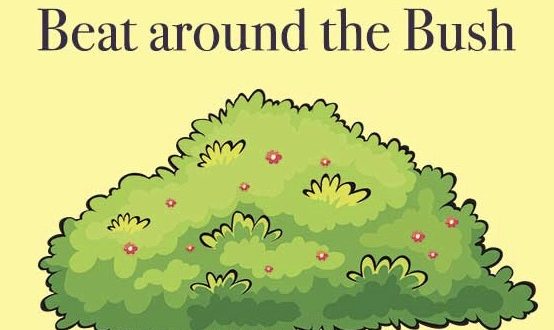In today’s episode I teach you how to use the expression “to beat around the bush”, which is a common idiom used in English when telling someone “to get to the point”.
Hey guys. Welcome to this episode of Aussie English. Today we’re going to do a… another episode on expressions, and this expression is “to beat around the bush” or “to beat about the bush”.
So “to beat around the bush” is the US version. It’s the version of this expression that originates from the United States, or “to beat about the bush” is the version that originates from the UK. Now for me personally, and I’m not sure why. These things just happen in language, “to beat around the bush” is the expression that I would use and that I definitely think I hear more often. I have heard both before, but “to beat around the bush” is a lot more common today.
So, “to beat around the bush”. What does this mean? The definition of “to beat around the bush” means to avoid answering a question or to stall, to waste time. So, if you stall it means that you are trying to waste a lot of time before having to actually do something. So, say, someone was um… asked a question as a politician, for example, and they keep talking but they don’t actually answer the question. You could say they’re stalling. Um… they’re avoiding answering the question. They’re wasting time.
So, I’ll go through, as usual, the definition of the words in the phrase “to beat around the bush”, and then I’ll… might explain a little bit about the origin of this phrase because I looked into it and it was pretty interesting. I’ll go over some examples after that, and then we can do an exercise using this expression to practice your pronunciation.
So, “to beat around the bush”. “To beat”, “to beat”, it’s a verb and it means to strike, whether it’s a person or animal. To strike, to hit, to beat something, um… to strike something repeatedly and violently in order to hurt or injure it, and it’s typically done with an implement, so, a club or a whip. So, if you beat someone you could be holding a stick and if you hit the person with a stick you’re beating them. You can also beat them with your hands. So if you start punching someone you can beat them, and this is where we would also say “to beat someone up” means to… to punch them repeatedly, to keep hitting them until they are unable to… to move. You know they’re… they’re really hurt. They’re injured. You beat them up.
“Around” and in the sense “about”. So to beat around the bush and to beat about the bush. “Around” and “about” in this sense just means on each side of, or on every side of something. So, say, if I walk around my room I walk all around my room. I go from one side of my room to the other side of my room. I go everywhere. The UK English people would often use the word “about” to do the same thing. I can walk “about” my room. I can walk from one side of my room to the other, walking “about”. Um… however, yeah, for me at least in Australian English it would be a lot more common to say “walk around my room” than “walk about my room”. However, both make sense, and Australians would understand what you mean if you were to use either one of those words. So, “around” just means on every side of, on each side of.
“A bush”, or “the bush”, is a shrub or a clump of shrubs. And a shrub is just a small plant often a bushy shrubby plant. So it means that it’s… it’s not very tall. It can be often wider than it is tall, which means that it’s bushy, it’s shrubby. Um… so “a shrub or a clump of shrubs with stems of moderate length” is apparently the definition of a bush. In Australian English when you said “a bush” and you’re not talking about “the bush” as in the forest here in Australia or the outback, you’d be talking about a relatively small plant that is really thick with leaves and with stems. So it’s not like a tree. So that’s “a bush”.
So, the origin of the phrase “to beat around the bush” or “to beat about the bush”, it actually goes back a long way. So it’s actually really old. I was reading that it originates from the 1400s, so the 15th century. So, this phrase, or this expression evolved from people who would hunt for birds and they would have someone who wasn’t holding a gun but was instead holding, say, a stick or some sort of implement, some tool that they could beat with, and they would go to bushes, to plants, where they thought birds were, where they thought there were birds hiding inside of the bushes, and in order to scare the birds out of the bushes they would hit the bush, they would beat the bush with a stick or whatever implement or tool they had, and when the… the birds flew out of the bush the hunters could then shoot the birds. So, that was beating literally around the bush. So they would hit the bush on all sides and they would scare the birds out of the bush. And so, beating around the bush was everything that happened before the hunt. It was all of the boring stuff before they got to the good stuff of hunting the birds, getting the birds, and finishing up. And so, I think that’s where this expression of “to beat around the bush” comes in. It’s all of the needless and boring stuff that happens before the main event. Before capturing the birds in the literal sense, or before actually getting to your point. So, if you beat around the bush it means that you’re wasting a lot of time before actually getting to the main point of whatever it is, you know, it could be answering a question.
So, examples of where you would use this:
“Stop beating around the bush and just tell me what you want”. This could be say an argument between a couple, so, a man and a woman, or two women or two men. And, say, one of them wants something but is having a hard time explaining it, or isn’t explaining it well, or is avoiding the real topic, and the other person has said, you know, “Stop beating around the bush and just tell me what you want”, which means, you know, “Stop wasting time and just tell me what you want. Get to the point”.
Um… say, a politician has been asked a question that is really hard and is likely to make them look bad. Um… and the politician just keeps talking and trying to get around the question, we would often say in English, so he’s trying to avoid the question, he’s trying to talk around the question. Someone could say, “Look stop beating around the bush and answer the question”. “Stop beating around the bush. Get to the point. Answer the question!” “Stop beating around the bush”.
Um… one more example could be, say, I have to explain what I’ve done to my parents, you know, say something happened at school and I was in trouble. I got detention, and then the school rang my parents and said, “Your son’s been in trouble, you need to talk to him about what happened. We’re not going to tell you but we want him to tell you what happened”. Say I went home and my parents have said, you know, “What happened at school, you got in trouble, tell us what happened”. And I said, you know, “Oh nothing really. It wasn’t a bit deal. I just, you know… I had an argument… and blah… “, you know, so I’m really wasting time. I’m not explaining what happened. I’m not getting to the point. My parents could say to me, “Look stop beating around the bush, quit beating around the bush and tell us what happened. Get to the point. Stop wasting time.”
So, I’ll run you through an example sentence now and I’ll change the pronoun at the front for you to practice your conjugation as well as your pronunciation and the phrase is, “I like to beat around the bush”. So let’s get started:
I like to beat around the bush.
You like to beat around the bush.
He likes to beat around the bush.
She likes to beat around the bush.
We like to beat around the bush.
They like to beat around the bush.
And just for something different let’s do this at a more natural pace, at a more natural speed. So, I’ll say it as if I would naturally and you guys just listen, try and practice it at the same speed in order to practice your pronunciation and fluidity of speaking.
I like to beat around the bush.
You like to beat around the bush.
He likes to beat around the bush.
She likes to beat around the bush.
We like to beat around the bush.
They like to beat around the bush.
Awesome guys, awesome. So, as well don’t be too discouraged if the exercises are hard. They’re often tongue twisters, you know, they’re difficult to pronounce. It may take a few times where you listen multiple times, skip to the exercises and practice them, but I think that these exercises are really helpful. Even if you know exactly what all of these words mean, and you know how to conjugate these verbs. It’s not challenging. It’s not so much about practicing grammar and practicing the definition of these words and learning the words. It’s more about practicing pronunciation so that you can really nail that when you speak. You can really do well at um… saying these words with a very reduced accent, and it’s also about learning the cadence, learning the rhythm, learning how English speakers say these phrases, and the ups and downs of how our voices change, our intonation, our cadence. So, this is one thing that I definitely practice every day when I’m using other languages like French and Portuguese. Often languages completely differ in how they are pronounced, in full phrases, like the cadence and the intonation of the voice, and these are the things that you can’t really read about and practice. You just have to keep listening and repeating, listening and repeating, and if probably never ends. You’ve got to do it all the time to improve.
 ایرانیان استرالیا Australia Iran بزرگترین جامعه ایرانیان ساکن استرالیا Australia Iran
ایرانیان استرالیا Australia Iran بزرگترین جامعه ایرانیان ساکن استرالیا Australia Iran











